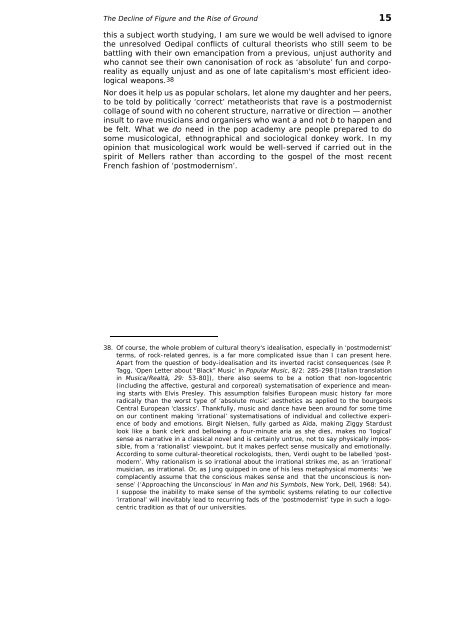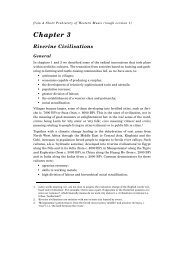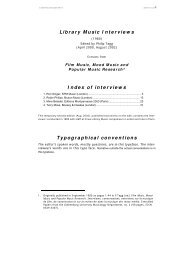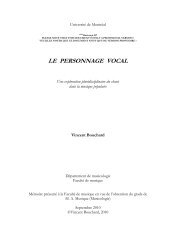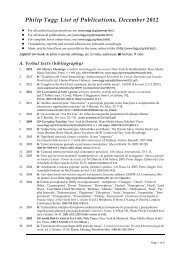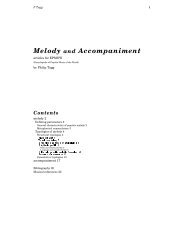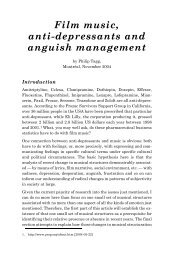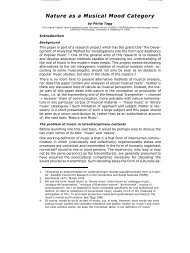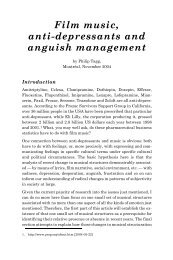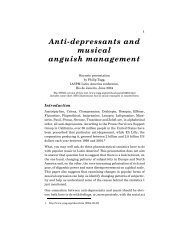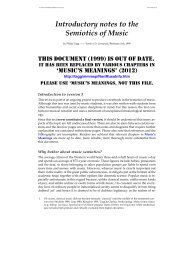From Refrain to Rave - Philip Tagg's home page
From Refrain to Rave - Philip Tagg's home page
From Refrain to Rave - Philip Tagg's home page
Create successful ePaper yourself
Turn your PDF publications into a flip-book with our unique Google optimized e-Paper software.
The Decline of Figure and the Rise of Ground 15<br />
this a subject worth studying, I am sure we would be well advised <strong>to</strong> ignore<br />
the unresolved Oedipal conflicts of cultural theorists who still seem <strong>to</strong> be<br />
battling with their own emancipation from a previous, unjust authority and<br />
who cannot see their own canonisation of rock as ‘absolute’ fun and corporeality<br />
as equally unjust and as one of late capitalism's most efficient ideological<br />
weapons.38<br />
Nor does it help us as popular scholars, let alone my daughter and her peers,<br />
<strong>to</strong> be <strong>to</strong>ld by politically ‘correct’ metatheorists that rave is a postmodernist<br />
collage of sound with no coherent structure, narrative or direction — another<br />
insult <strong>to</strong> rave musicians and organisers who want a and not b <strong>to</strong> happen and<br />
be felt. What we do need in the pop academy are people prepared <strong>to</strong> do<br />
some musicological, ethnographical and sociological donkey work. In my<br />
opinion that musicological work would be well-served if carried out in the<br />
spirit of Mellers rather than according <strong>to</strong> the gospel of the most recent<br />
French fashion of ‘postmodernism’.<br />
38. Of course, the whole problem of cultural theory's idealisation, especially in ‘postmodernist’<br />
terms, of rock-related genres, is a far more complicated issue than I can present here.<br />
Apart from the question of body-idealisation and its inverted racist consequences (see P.<br />
Tagg, ‘Open Letter about “Black” Music’ in Popular Music, 8/2: 285-298 [Italian translation<br />
in Musica/Realtà, 29: 53-80]), there also seems <strong>to</strong> be a notion that non-logocentric<br />
(including the affective, gestural and corporeal) systematisation of experience and meaning<br />
starts with Elvis Presley. This assumption falsifies European music his<strong>to</strong>ry far more<br />
radically than the worst type of ‘absolute music’ aesthetics as applied <strong>to</strong> the bourgeois<br />
Central European ‘classics’. Thankfully, music and dance have been around for some time<br />
on our continent making ‘irrational’ systematisations of individual and collective experience<br />
of body and emotions. Birgit Nielsen, fully garbed as Aïda, making Ziggy Stardust<br />
look like a bank clerk and bellowing a four-minute aria as she dies, makes no ‘logical’<br />
sense as narrative in a classical novel and is certainly untrue, not <strong>to</strong> say physically impossible,<br />
from a ‘rationalist’ viewpoint, but it makes perfect sense musically and emotionally.<br />
According <strong>to</strong> some cultural-theoretical rockologists, then, Verdi ought <strong>to</strong> be labelled ‘postmodern’.<br />
Why rationalism is so irrational about the irrational strikes me, as an ‘irrational’<br />
musician, as irrational. Or, as Jung quipped in one of his less metaphysical moments: ‘we<br />
complacently assume that the conscious makes sense and that the unconscious is nonsense’<br />
(‘Approaching the Unconscious’ in Man and his Symbols, New York, Dell, 1968: 54).<br />
I suppose the inability <strong>to</strong> make sense of the symbolic systems relating <strong>to</strong> our collective<br />
‘irrational’ will inevitably lead <strong>to</strong> recurring fads of the ‘postmodernist’ type in such a logocentric<br />
tradition as that of our universities.


